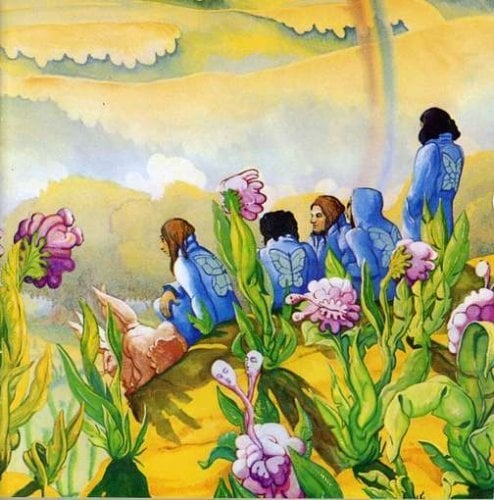
August 3, 2011; Firewall/The End
http://www.direngrey.co.jp/english/e-information.html
Dir en Grey are a hard lot to pigeonhole. Formerly one of the establishing bands of the visual kei scene in Japan, a subgenre defined by flamboyant (some would say downright fruity) dress as much as the distinctly Japanese mishmash of post-hardcore, goth balladry and metal most of those largely mediocre bands play, Dir en Grey have since expanded to Western shores and have gradually evolved into something distinctly different and far better. They are often unfairly shoved into the Hot Topic/nu-metal/metalcore ghetto for their dramatic (at times bordering on overwrought) and bleak lyrical imagery and videos, or more recently dubbed as pandering sellouts by many of the fickle J-fetishists who originally popularized them here for their more metallic stylings starting with the 2003 album Vulgar.
All this static aside, Dir en Grey are unusually popular for a foreign-language band in the U.S., and they make pretty damn good albums to support that popularity. Dum Spiro Spero is one of them, continuing the development into transcendent sonic juggernaut began by its predecessor Uroboros while possessing its own darker, thornier and more complex nature.
From the eerie minor-key piano and disturbingly hellish distortion of intro "Kyoukotsu no Nari," a direct antipode of Uroboros' "Sa Bir," this intention is announced pretty early on--and then it launches into "The Blossoming Beezlebub," which sounds like nothing else prior from this band. Superhuman frontman Kyo displays the full extent of his vocal range here, from choir-like, barely lucid chants to a freakish shriek and strangled moans over dark, sinuous guitar melodies courtesy of adept duo Kaoru and Die, all rendered with a washed-out, nightmarish mix. It feels far shorter than a seven-minute song has any right to.
I was initially somewhat disappointed with following track and single "Different Sense"--it begins much like a fairly average deathcore song, right down to Kyo's new deep gurgling vox, blastbeats, and even full-blown guitar hero solos (a first for this band)--yet by the middle it has evolved into a "typical" Dir en Grey sound, with the powerful soaring vocals fans have come to expect. It breaks interesting new territory for the band, even if it seems a little derivative on first blush. Both "Juuyoku" and ""Yokusou ni Dreambox" Aruiwa Seijuku no Rinen to Tsumetai Ame" (don't ask me to translate that) are more successful, the latter a miasma of churning midpaced sections punctuated by eccentric thrashing breaks with Kyo once again going fucking nuts. Anyone that can draw frequent comparisons to Mike Patton is doing something very right. "Lotus," the other major single, is a traditional Dir en Grey ballad filtered through their latter-day sophistication--among the best they've done in that style, and one of the few tracks on here that clearly falls into such easy labeling.
Then there is "Diabolos," the token schizo epic in the vein of the previous album's "Vinushka" or Macabre's title track (still one of the best things they've ever done), and while it's a strong track I don't think it quite makes it to that esteemed level. It isn't formulaic by any means, but other than a few new vocal turns and a beautiful, shimmering section close to the end it doesn't feel especially innovative. Still even an "average" DEG epic shits on most bands, and "Diabolos" hardly impairs the momentum of the album. After a few quicker, thrashing numbers that somewhat blend together, the last two tracks end Dum Spiro Spero very strongly--the somber and gorgeous "Vanitas," and "Ruten no Tou" which effortlessly blends soaring choruses, creeping verses, some blasting sections and a stunning outro in a way that makes it more representative than anything else on the album and would've made the most logical single in my estimation.
Bottom line, Dum Spiro Spero is another solid entry in DEG's growing oeuvre, and if it falls short of the excellent Uroboros in accessibility and standout tracks, its uniquely murky and cryptic ambience and full embrace of metal influences combined with the darker, heavier feel of earlier albums like Vulgar and Marrow of A Bone make it an inevitable grower and show that the band is committed to the experimental path they've forged for themselves. At this rate their future material promises to be something to behold, and here's to hoping that next time it doesn't take three goddamn years to drop.
-SJ

